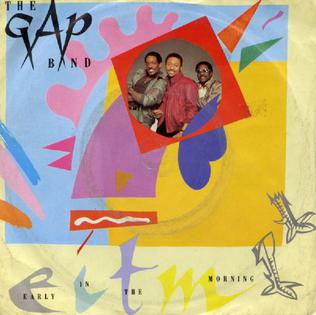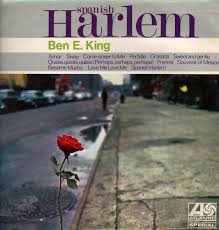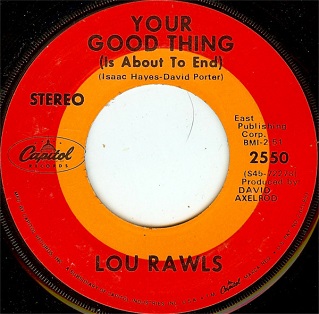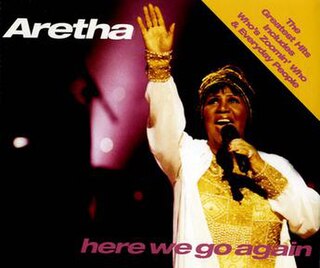
"You're All I Need to Get By" is a song recorded by the American R&B/soul duo Marvin Gaye and Tammi Terrell and released on Motown Records' Tamla label in 1968. It was the basis for the 1995 single "I'll Be There for You/You're All I Need to Get By" from Method Man and Mary J. Blige.

"Early in the Morning" is a song originally performed by The Gap Band, and written by member Charlie Wilson and producers Lonnie Simmons and Rudy Taylor.

"Spanish Harlem" is a song recorded by Ben E. King in 1960 for Atco Records. It was written by Jerry Leiber and Phil Spector and produced by Jerry Leiber and Mike Stoller. "Spanish Harlem" was King's first hit away from The Drifters, peaking at number 15 on Billboard's rhythm and blues and number 10 in pop music chart.
"Sincerely" is a popular song written by Harvey Fuqua and Alan Freed and first released by The Moonglows in 1954.
Linked here are Billboard magazine's number-one rhythm and blues hits. The Billboard R&B chart is today known as the Hot R&B/Hip-Hop Songs chart.

"Until You Come Back to Me (That's What I'm Gonna Do)" is a song written by Morris Broadnax, Clarence Paul, and Stevie Wonder. The song was originally recorded by Stevie Wonder in 1967, but his version was not released as a single and did not appear on an album until 1977's anthology Looking Back. The best-known version of this song is the 1973 release by Aretha Franklin, who had a million-selling top 10 hit on Billboard charts. The song reached No. 1 on the R&B chart and No. 3 on the Hot 100 chart in 1974. It became an RIAA Gold record.
"Good Times" is a song written and recorded by Sam Cooke, released as single in 1964.
"Call Me" is a song written and recorded by American singer Aretha Franklin. The song was co-produced by Jerry Wexler, Tom Dowd and Arif Mardin.
"Share Your Love with Me" is a song written by Alfred Braggs and Deadric Malone. It was originally recorded by blues singer Bobby "Blue" Bland. Over the years, the song has been covered by various artists, most notably Aretha Franklin who won a Grammy Award for her 1969 rendition. Other artists who covered the song include The Band in 1973, Kenny Rogers in 1981, and most recently, Van Morrison in 2016.
"All I Could Do Was Cry" is a doo-wop/rhythm and blues single recorded in 1960, and released in March that year by the singer Etta James. It was written for James by Chess songwriter Billy Davis, Berry Gordy and his sister Gwen Gordy. The song eventually peaked at number 2 on the US Billboard R&B chart and number 33 on the pop chart. James would later re-record the song in the early 1990s.

"Almost Grown" is a song written and recorded by Chuck Berry. It was released as a double A-side with "Little Queenie".

"Your Good Thing (Is About to End)" is a song written by Isaac Hayes and David Porter. The song was originally recorded by Mable John in 1966. It peaked at number 95 on the Billboard Hot 100 and number 6 on the R&B Charts.
"Jump to It" is a 1982 song by American recording artist Aretha Franklin. The track is from her Gold-certified 1982 album of the same name, produced by Luther Vandross. The song was written by Vandross and Marcus Miller and features background vocals performed by Vandross and Cissy Houston. The single reached No. 1 on Billboard's Hot Soul Singles chart, remaining there for four consecutive weeks.
"There's Something on Your Mind " is a song originally recorded as "There Is Something on Your Mind" in 1957 by Big Jay McNeely. The song credits Cecil James McNeely as its writer, Big Jay McNeely's birth name. The song has been recorded many times since then by Big Jay McNeely himself with various collaborators.
"Don't Cry Baby" is a song composed by James P. Johnson, with lyrics by Saul Bernie, and Stella Unger. The song was first recorded on October 11, 1929 by Bessie Smith, who was accompanied on piano by Johnson. The song was revived in 1943 by jazz bandleader Erskine Hawkins, who greatly simplified Johnson's original composition by removing both the introductory (sectional) verse and the "B" section of the chorus. This simplified arrangement formed the basis of most later recordings on the song. Throughout the late 1940s and 1950s, the song was recorded fairly regularly, but was not a hit again until Etta James recorded it in 1961. Between 1962 and 1964, versions were released by James Brown, Aretha Franklin, and Ray Charles. Since the mid-1960s, the song has been occasionally revived.
"Stone Cold Dead in the Market (He Had It Coming)" is a 1939 song with lyrics and music by Wilmoth Houdini, a Trinidad and Tobago musician who had moved to the United States. Houdini's first version bore the title "He Had It Coming." It was recorded in 1946 by Ella Fitzgerald and Louis Jordan and His Tympany Five on Decca and later included in the Ella Fitzgerald album Ella and Her Fellas.
"I Want To Be Loved (But Only By You)" is a 1947 ballad written by and recorded by Savannah Churchill and The Sentimentalists. The single was Savannah Churchill's most successful release on the R&B charts, spending six months on the chart and reaching number one on the R&B Juke Box chart.
"Tell Mama" is a song written by Clarence Carter, Marcus Daniel and Wilbur Terrell. It is best known in its 1967 recording by Etta James. An earlier version of the song was first recorded in 1966 by Carter, as "Tell Daddy".

"Here We Go Again" is a song by American singer and songwriter Aretha Franklin. It was written by Trina Broussard, Jermaine Dupri and Trey Lorenz for Franklin's thirty-fourth studio album, A Rose Is Still a Rose (1998), while production was helmed by Dupri and Manuel Seal. The song is built around replayed portions of "The Glow of Love" (1980) by Italian-American post-disco group Change. Due to the inclusion of the sample, Mauro Malavasi, David Romani and Wayne K. Garfield are also credited as songwriters. The song was the second single released from A Rose Is Still a Rose in June 1998 and reached number 76 on the Billboard Hot 100, also becoming Franklin's fifth number one on the US Dance Club Songs.







